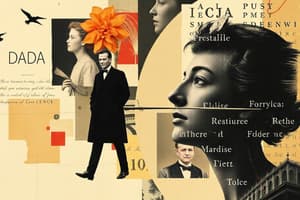Podcast
Questions and Answers
Which statement accurately describes the primary focus of drama as a literary genre?
Which statement accurately describes the primary focus of drama as a literary genre?
- It is centered around characters, conflicts, and dialogue intended for performance. (correct)
- It presents complex plots through extensive narrative exposition.
- It emphasizes lyrical language and poetic form.
- It primarily explores individual characters' inner thoughts.
What distinguishes a short story from a novel?
What distinguishes a short story from a novel?
- A short story typically features multiple plots.
- A short story is always written in verse form.
- A short story usually explores broad themes.
- A short story involves a limited set of characters and focuses on a single event. (correct)
Which literary device is specifically characterized by a contrast between what is expected and what actually occurs?
Which literary device is specifically characterized by a contrast between what is expected and what actually occurs?
- Foreshadowing
- Irony (correct)
- Imagery
- Allusion
How does symbolism function within literary works?
How does symbolism function within literary works?
What role does close reading play in the study of English literature?
What role does close reading play in the study of English literature?
What characterizes the Anglo-Saxon Period in English literature?
What characterizes the Anglo-Saxon Period in English literature?
Which significant themes were explored during the Renaissance period?
Which significant themes were explored during the Renaissance period?
What distinguishes the Neoclassical Period in English literature?
What distinguishes the Neoclassical Period in English literature?
Which literary characteristics define the Romantic Period?
Which literary characteristics define the Romantic Period?
During the Victorian Period, literature often addressed which societal issues?
During the Victorian Period, literature often addressed which societal issues?
Which of the following best describes Modernism in literature?
Which of the following best describes Modernism in literature?
What is a defining feature of Postmodernism in contemporary literature?
What is a defining feature of Postmodernism in contemporary literature?
Which literary work is associated with the medieval period?
Which literary work is associated with the medieval period?
Flashcards
Poetry
Poetry
A type of writing that uses expressive language, rhythm, rhyme, and specific forms to explore themes and ideas.
Drama
Drama
A type of writing designed to be performed on stage, featuring characters, conflicts, dialogue, plot, and theatrical elements.
Novel
Novel
A lengthy fictional narrative with developed characters, setting, plot, and themes. It often explores social, political, or psychological issues.
Short Story
Short Story
Signup and view all the flashcards
Allusion
Allusion
Signup and view all the flashcards
English Literature
English Literature
Signup and view all the flashcards
Anglo-Saxon Period
Anglo-Saxon Period
Signup and view all the flashcards
Medieval Period
Medieval Period
Signup and view all the flashcards
Renaissance
Renaissance
Signup and view all the flashcards
Neoclassical Period
Neoclassical Period
Signup and view all the flashcards
Romantic Period
Romantic Period
Signup and view all the flashcards
Victorian Period
Victorian Period
Signup and view all the flashcards
Modernism
Modernism
Signup and view all the flashcards
Study Notes
Overview of English Literature
- English literature encompasses a vast body of written works in the English language, reflecting diverse cultural, social, and historical contexts across centuries.
- It includes poetry, drama, novels, short stories, and other prose forms, demonstrating the evolution of language, styles, and themes.
Historical Periods and Movements
-
Anglo-Saxon Period (c. 450-1150): Known for epic poems like Beowulf, showcasing Germanic traditions, oral storytelling, and early Christian influences. Focuses on heroism, battles, and supernatural elements.
-
Medieval Period (c. 1150-1485): Notable examples include Sir Gawain and the Green Knight, Chaucer's Canterbury Tales, and religious allegories. This period reflects chivalry, religion, courtly love, and significant use of allegory and symbolism.
-
Renaissance (c. 1485-1660): Marked by a revival of classical learning and humanism. Shakespeare's plays, sonnets, and other works are prime examples of this vibrant period. Themes of love, ambition, and fate are central.
-
Neoclassical Period (c. 1660-1785): Inspired by classical Greek and Roman models, emphasizing reason, order, and restraint. Satire, wit, and elegance are prominent in poetry and prose. Political and philosophical debates significantly shaped the period.
-
Romantic Period (c. 1785-1830): Characterized by a focus on emotion, imagination, nature, and individualism. Wordsworth, Coleridge, Byron, Shelley, and Keats are key figures. Emphasis on personal experience, imagery, and exploration of human potential.
19th Century Literature
- Victorian Period (c. 1837-1901): Reflecting industrialization, social change, and urbanization. Dickens' novels, Bronte sisters' novels, and Tennyson's poetry are significant examples. Exploration of morality, social inequality, and the effects of industrialization is key.
20th and 21st Century Literature
-
Modernism (c. 1900-1945): A departure from traditional forms and values, reflecting modern anxieties and uncertainties. Joyce, Woolf, and Eliot are key figures. Experimentation with language and narrative techniques is prevalent.
-
Postmodernism (c. 1945-present): A reaction against Modernism, exploring fragmentation, subjectivity, and the role of language. Diverse voices challenge established norms and narratives.
Literary Genres
-
Poetry: Expressive language using meter, rhyme, and form. Themes are explored through imagery, figurative language, and structure.
-
Drama: Intended for performance, emphasizing characters, conflicts, dialogue, plot, and stagecraft.
-
Novel: Extended fictional narratives exploring characters, setting, plot, and theme in depth. Often represent a particular time and environment, and explore social, political, and psychological issues.
-
Short Story: Brief narratives focusing on a single event or a limited set of characters. Concentrate on exploring specific themes or situations.
Key Literary Devices
-
Imagery: Language engaging the senses.
-
Metaphor: A figure of speech comparing unlike things without "like" or "as".
-
Symbolism: Concrete objects representing abstract ideas.
-
Allusion: Referencing other literary works, historical events, or mythology.
-
Irony: Contrast between appearance and reality, expectation and result, or meaning and intention.
-
Foreshadowing: Hints of future events, creating suspense and anticipation.
-
Setting: The time and place of a story.
-
Theme: The underlying message or idea of a literary work.
Studying English Literature
- Understanding historical context is essential for interpreting literary works.
- Examining literary devices and techniques helps appreciate authorial choices.
- Close reading reveals meaning and subtle nuances.
- Analyzing characters, plots, and settings reveals cultural values and societal issues.
Studying That Suits You
Use AI to generate personalized quizzes and flashcards to suit your learning preferences.




